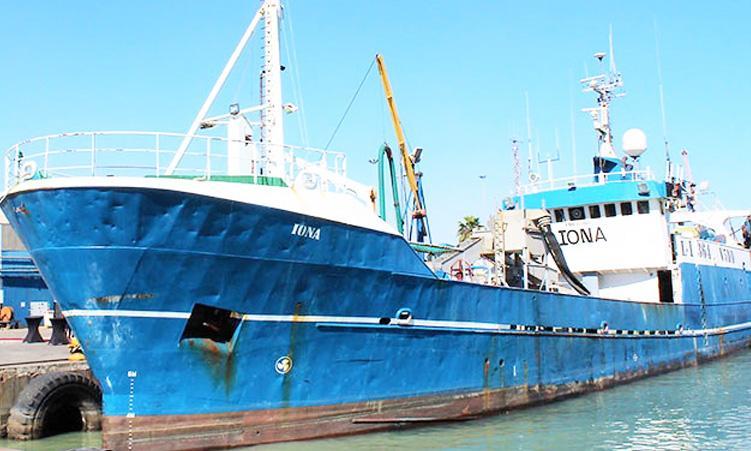Africa-Press – Namibia. THE Ministry of Agriculture, Fisheries, Water and Land Reform says the allocation of 10 000 tonnes of pilchard governmental objective quota to Eco Fish Farms was a strategic, time-saving measure.
The ministry says this in a statement issued yesterday.
“Considering that pilchard is the only Namibian fish species with a history of canning, and the Etosha Fishing Corporation is the only functional and approved cannery, the decision to access this facility on Namibian soil given the limited time, quantities of harvestable pilchard, coupled with logistical readiness to commence canning should be seen as strategic and not as corruptly selected as purported,” the statement reads.
The ministry was reacting to reports in The Namibian as well as criticism from the Wet Landed Small Pelagic Association and the Confederation of Namibian Fishing Associations, which have questioned the quota awarding process.
They claim the decision was not in line with a Cabinet directive that says that the quota should be awarded to a company or companies with processing facilities, using environmentally friendly fishing methods.
The governmental objectives quota, according to the ministry, was to be awarded to Namibian-owned companies and the landed pilchard must be processed into cans in the country.
The participating companies were also required to have fishing vessels and must be able to start harvesting and processing within the remaining months of the fishing season, which ends on 31 December.
The ministry says no other applicant met these criteria, despite the fact there is no pilchard rights holder.
The ministry says all pilchard fishing rights expired between 2019 and 2020.
“The option of auctioning this quota was internally dismissed since the process is lengthy and challenges domestic employment sustenance,” the ministry says.
‘LIMITED TIME’
It points to the fact that only a limited time to harvest pilchard was left in the year as the reason for the quota being awarded to a single company.
The ministry says there is currently only one mechanically functional cannery with approval from the Namibian Standards Institution (NSI) that can legally can the fish.
It says the quota was awarded to Eco Fish Farms (Pty) Ltd, which is 100% Namibian owned by businessman Ivo de Gouveia, who is also a shareholder in Etosha Fishing Corporation.
“The ministry underscores that the primary objective of this governmental objectives quota on precautionary basis was to contribute to National Food Security, sustain employment at the Etosha Fishing Corporation cannery in cooperation with Eco Fish Farms (Pty) Ltd.
“In addition, revenue would be collected in the form of quota fees, fund levies, by-catch fees and taxes wherever applicable,” the ministry says.
This is despite Etosha Fishing’s managing director, Volker Paulsmeier, having asked the ministry for the fish to be allocated to companies with canneries on 14 August.
“We urgently appeal to you to ensure that the ministry immediately executes the Cabinet’s decision to allocate the 10 000 tons of pilchards to the canneries,” he says.
Etosha Fishing is 44.8% South African owned by the Johannesburg Stock Exchange-listed Oceana Group Limited.
OBJECTIONS
Oceana has requested the Etosha board to meet to consider the matter.
The Namibian reached out to De Gouveia on several occasions, but he has not responded at the time of going to print.
The allocation of the quota was also objected to by the Wet Landed Small Pelagic Association, which asked that the allocation be put on hold to initiate a transparent investigation, ensuring the quota is properly and lawfully allocated.
Adolf Burger, the general manager of Princess Brand, which is the only other company with a cannery in the country, says the company has been informing the ministry for years that its cannery facility is complete and that NSI certification is subject to the pilchard quota being issued.
“It’s a huge investment that has been idle for years, and in full production can employ approx 450 Namibians,” he says.
He says the company has an under-utilised onshore NSI certified state-of-the-art processing factory, which currently employs approximately 650 workers.
“The group also owns suitable NSI-approved vessels dedicated to pelagic fishing,” Burger says.
He says pilchard provides as much food security in frozen form as in cans at a fraction of the price.
“Frozen pilchard can reach the lower-income population at lower than a quarter of the cost of canned pilchard. This means feeding four or more people instead of one.
“As a company as well as member of the association of onshore pelagic factories we promoted fairness in the allocation of the pilchard quota much appreciated and approved by the Cabinet,” he says.
For More News And Analysis About Namibia Follow Africa-Press






